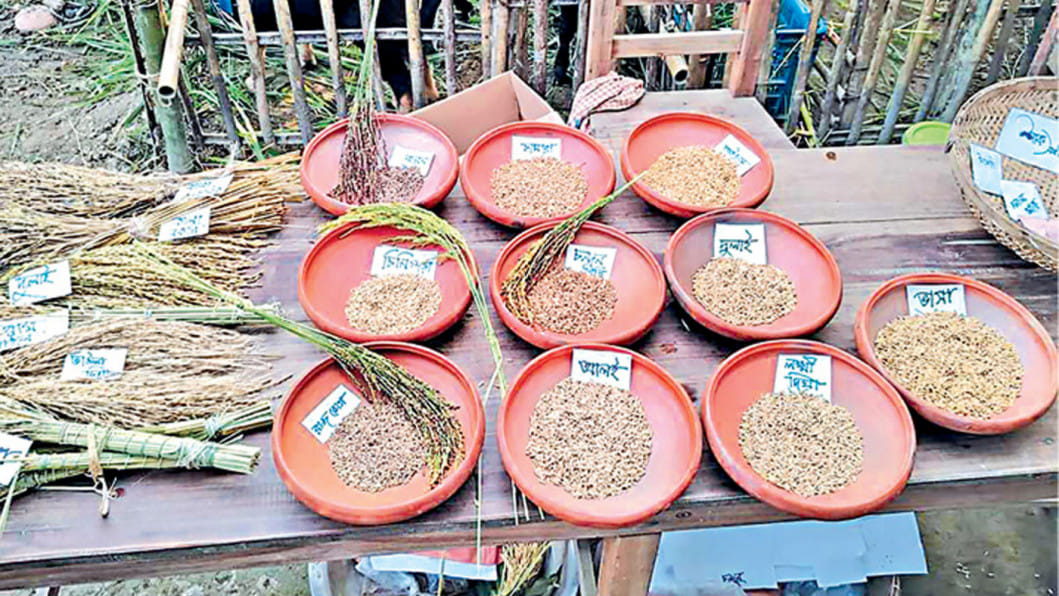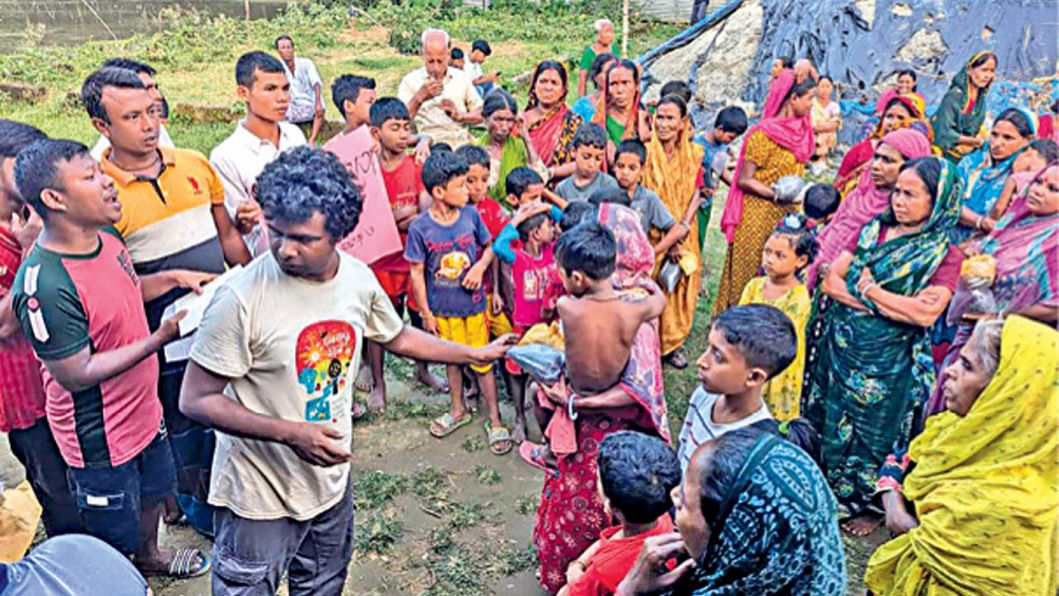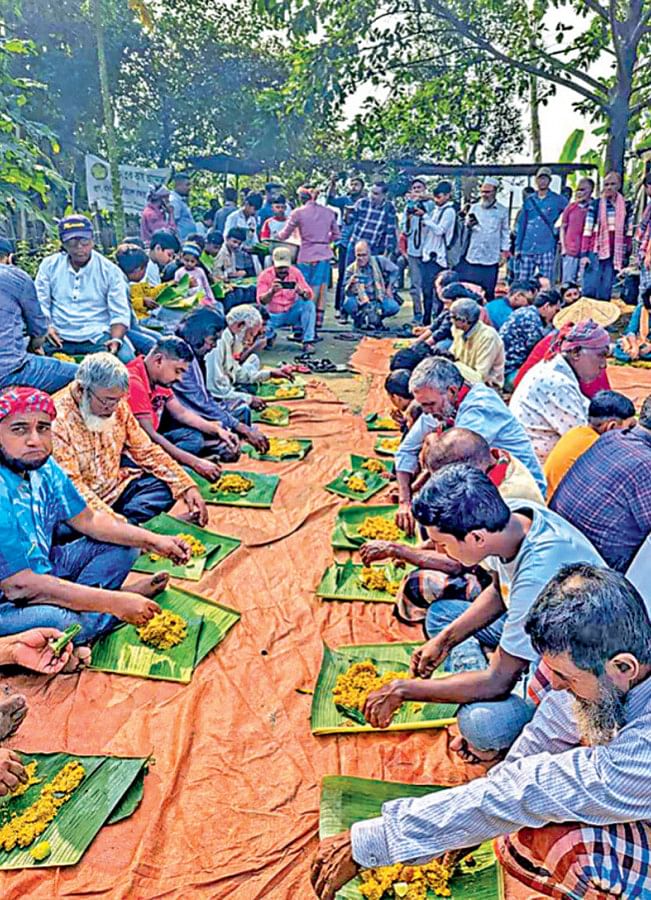Lease land, grow your own veggies, grains
It all began with a surprise addition to lunch -- long bean mash.
The emerald-green pods from my rooftop garden were steamed in the rice pot alongside the cooking rice. The starch imparted a subtle sweetness to this otherwise bland, often overlooked vegetable. Spiced with chili, onion, and mustard oil, this earthy, humble dish opened my eyes to the deeper issues of farming aggression in our country.
The difference in taste and flavour between my chemical-free rooftop produce and store-bought vegetables was striking!
I realised how much we are deprived of proper nutrition when buying genetically modified or hybrid vegetables from local bazaars or vans.
Thus began my search for natural farming produce.
My quest took me to a remote village in Koutia village of Baliakhora union in Ghior upazila of Manikganj, where Delowar Jahan, farmer and coordinator of the Natural Agriculture Centre and Biodiversity Farm (NACBF), grows crops and vegetables using natural farming methods.
This unique venture of organic farming initiated by Delowar and his friends in 2004 was a safe food campaign. After years of tests and trials, they now encourage enthusiasts to lease out arable lands from the NACBF to grow their vegetables organically.
I joined this initiative by leasing a one-decimal plot (435.6 sq. ft.) and planting winter greens like turnips, peas, cauliflower, radishes, and tomatoes. Working under the scorching sun, I learned to sow seeds, tend crops, and appreciate the intricacies of organic farming. This experience also gave me a newfound respect for farmers, whose struggles I now understand more deeply.
As a result, I am now farming leasing a one-decimal plot (435.6 sq ft). I have made five beds in my tiny land and after weeding out the grass and tilling the soil, I have planted winter leafy greens and vegetables like turnips, peas, cauliflower, cabbage, radish, beetroots, tomatoes, etc.
"With this initiative of hands-on involvement of general city people, we have planted the notion in them of the need to re-establish and encourage natural farming. The idea of cultivating winter vegetables caught on like wildfire. This season we have 25 families leasing out one to four decimal lands," Delowar explains their trending scheme.
Working in the fields under the scorching sun for the first time in my life, I learned to sow seeds, care for the harvest, and appreciate the process of organic farming. But I now see farmers in a whole different light as well. Many enthusiasts like me have started their farms by buying land in the village.
The Talk: Farmer to Farmer
Delowar is a promoter of folk ideology and traditional agriculture. He wants to live a meaningful life and grow safe, natural food. He demands the same from local farmers, to produce using only their primitive indigenous knowledge, and depending on natural resources and organic fertilisers. For him, farmers' cultural values and homegrown knowledge are more important when it comes to respecting nature.
Delowar and his like-minded group of communication researchers worked on the problems and crises plaguing our farming community and coaxed them to practice the native way of farming.
"Blending in with the local farmers and understanding their language and knowledge of primitive farming, their ways of working with nature, the soil, weather, and calamities are of utmost importance. If we were to work with them and for them, it was ideal to talk our way in, instead of disregarding their present need for chemical farming and imposing our textbook knowledge. It might not have worked out," Delowar explains their strategy to start over the age-old practice of natural farming.

For ages, farmers cultivated this fertile Gangetic delta in an indigenous way. They knew when to sow grains that would survive rough monsoons and flash floods or floods. These water-based grains thrived in summer rain and monsoon water.
Rural Bangladesh was once upon a time all about natural agriculture and farming. The farmers knew their land and crops.
They gradually shifted from indigenous farming methods to modern artificial practices as the state advocated for hybridisation to significantly boost crop yields, to meet the country's food demand and supply chain.
The farmers gradually resorted to farming using synthetic agrochemicals, pesticides, herbicides, and growth promoters to multiply their produce.
He says, "Hybridisation is farming tailored to environmental conditions with the capability of producing high-yielding crops. In this way, farmers create seeds from crossbreeding making agriculture more efficient and sustainable.
"But that is just half of the story. Aggressive farming has suppressed 1,200 years of successful local agricultural knowledge. Now farmers are rooting for the hybrid way and believe that growing produce without chemicals is impossible," he says.
The state demands magnified production of crops to feed its population, and capitalist businesses thrive on this requirement. However, there is zero communication on the harmful side effect of chemical farming. There are no guidelines for managing the environmental and human health hazards posed by these methods.
"People have polluted the environment with harmful farming practices. Our job is to break this vicious circle. We want farmers to shift their focus to nature and environment-friendly eco-farming, where production may be less, but quality is ensured," he continues.
Initially, Delowar started practising eco-friendly agriculture in the villages of Manikganj, Tangail, and Jhenaidah as test runs, where they tried to create awareness among farmers about chemical farming.
"By taking a land lease on the bank of a small river in Manikganj, we began to produce crops without using chemical fertilisers and started to save the indigenous seeds and re-distribute them among villagers. We began by giving three days of intensive training to farmers and interested city people from 2012," he says.
By visiting the villages and speaking with the farmers, they realised that unless fair prices were ensured for their crops, poor farmers would not be interested in natural, poison-free farming.

So, they started working on changing the marketing system along with crop production and launched the Natural Agriculture Marketing Centre in Salimullah Road, Mohammadpur, where they started selling the produce in 2014.
"Vegetables and fruits produced without the use of chemicals was a novel idea back in 2014. For the poor farmers to sustain their living costs, we encouraged them to cultivate organically in a small section of their farm to begin with. At present, the crops produced by the farmers of 15 districts are being sold through our marketing centres," he says. These crops include those produced through Jum cultivation.
They now have farms in Narayanganj, Jhalokathi, Jhenaidah, Khustia, Rajbari, Pabna, Natore, Rajshahi, Naogaon, Dinajpur, Gaibandha, Bogura, Tangail, and Sylhet.
The story of biodiversity farm
For the past six years, Delowar has been farming on 0.33 acres of leased land in Ghior Upazila. At least 60 farmers now work on his farm, which also has fish farming ponds with its shorelines adorned with fruit trees.
Locally, his flood-resistant homestead is known as "basher bari" and any villager would point you to the sprawling courtyard.
The complex sports mud huts (his living quarters), a mud-built training centre, a granary, and a two-storied "bamboo machang" house for guests and visitors.
The cosy mud kitchen and open dining area are separated by a deep tubewell. This serene rural household always has food on the mud stove for impromptu visitors.
It was in this alfresco dining space I had my first taste of "adi dhan" or indigenous deep-water rice. The meal served in a terracotta beggar's bowl had khichuri made from bawaila digha rice grains, free-range chicken egg omelettes, and freshly picked coriander chutney. This was one of my most relished meals after working in the fields.
"We have collected 16 different local paddy seeds, which grow in deep water, from old farmers. We are currently harvesting these almost extinct varieties of grains called hizol digha, bawaila digha, lokhi digha, chamara, dhepo, dulai boron, chondon binni, rajbhol, aamshail, and mofhushail this Aman rice season," he informs.
Aman is the winter rice season. The crops of this season are monsoon dependent as sowing is done in June-July and harvesting begins in November-December. This Aman harvest time is a celebration of the age-old farmers' ritual of Nobbano -- nobo (new) and onno (rice) which literally means new rice.
Throughout the year they also harvest 20 variants of indigenous rice for mass production, consumption, sale, and growing a seed bank. According to a 20th-century survey, there were once 15000 adi dhan variants in both East and West Bengal.
This natural farming centre runs entirely on solar power. Most interestingly, Delowar has made a jhop (that translates to a bush in English) of small trees and ferns to house birds, bees, insects, snakes, and frogs which play an important role in protecting biodiversity.
Bangladesh is a slope basin: farmers knew what to reap
Genetically modified food lacks the much-needed micronutrients like zinc, magnesium, iron, iodine, folate, vitamins B12 and A, and other minerals in grains. The overuse of chemical fertiliser compromises the soil fertility. It also contaminates the nearby brooks and ponds killing the aquatic life. It directly affects the health of farmers because they do not use any protective gear while spraying chemicals and fertilisers. They mostly work barefoot and without a mask.
"We are aware of the detrimental effects of chemical farming, yet we do not take any action against it. In the process, the farmer becomes the real victim. As he eyes maximum production, he ends up spending more on fertilisers and chemicals, putting his and his soil's and future generations' wellbeing on the line. We are here to just point these issues to them.

"In my opinion, the state's promotion of chemicals including fertilisers for enhanced production to feed its people is a scam game of profit and greed. In Bangladesh, almost 40 percent of food is wasted for miscellaneous reasons during the process of bringing the food from the field to the table," he says.
To transition back to natural farming, a chemical-affected land requires at least four years to regain its fertility. Therefore, we encourage farmers to start organic farming with small sections of their land. This approach allows them to sustain their family's living expenses while gradually expanding to larger plots as they gain confidence and experience, he explains.
The Natural Agriculture Research Centre has launched a nature-saving and safe agriculture movement. This initiative focuses on farmer-to-farmer education and sustainable production practices, and safeguards seed varieties. And the profit it makes is reinvested in research to expand its horizon.
Ultimately, living in harmony with nature is a meaningful life aspiration we all share -- yet that remains elusive for many.
Photo: Natural Agriculture Centre and Biodiversity Farm

 For all latest news, follow The Daily Star's Google News channel.
For all latest news, follow The Daily Star's Google News channel. 






Comments